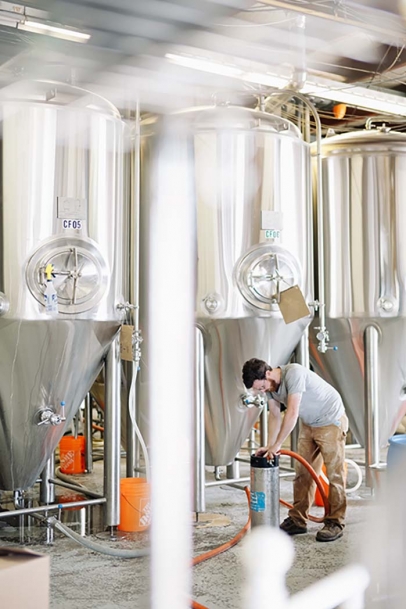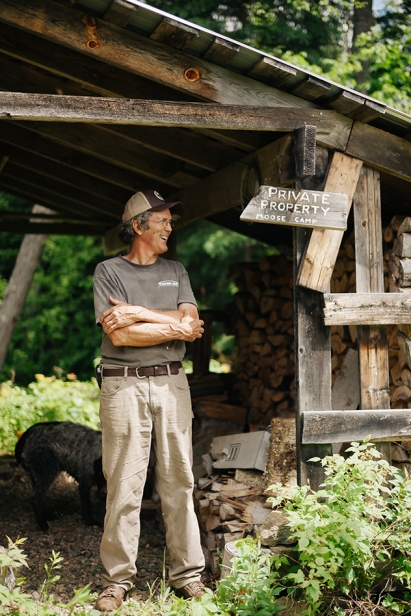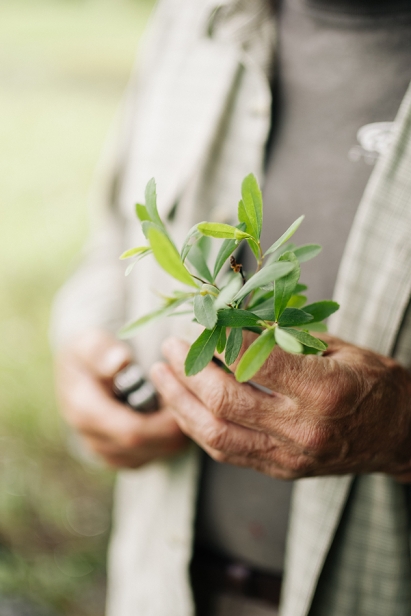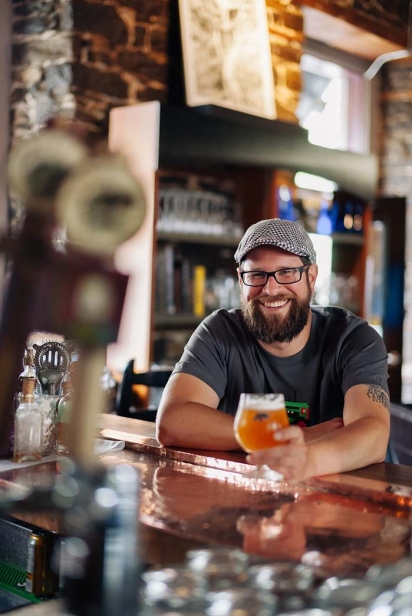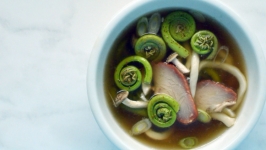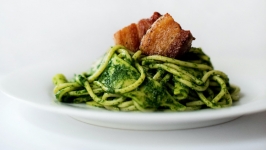Bog-Hoppin' Good Beer
Francis McDermott is setting out in his 10-foot-long aluminum boat in Alfred Bog, looking for a mysterious wild herb. His wire-haired griffon dog, Sophie, rides up front to navigate. “The whole world comes through her nose,” McDermott says.
They are about 20 kilometres from the Ottawa River, past Petawawa, on the Quebec side of the provincial border. McDermott has a 200-acre hunt camp here, surrounded by Crown land that includes about 40 acres of bog or swamp.
He keeps an eye out for little canals built by beavers, because the little-known herb he seeks — Myrica gale, which is also known as bog-myrtle — often grows nearby. “Beavers are my friend,” McDermott says.
Beer is the end game. In a busy year, he will harvest about 100 pounds of Myrica gale, an edible flowering shrub with a sweet resinous scent, used in beer-making in northwestern Europe until hops supplanted it in the 1500s. McDermott also forages white spruce tips, and he sells it all to Beau's All Natural Brewing Company.
The revenue from the Myrica gale accounts for about 30 per cent of his annual income. “I tend to live frugally,” he says. “My annual income is less than $20,000.” McDermott’s enterprising approach to foraged beer ingredients makes him one of a few who are harnessing a slow but growing movement on the part of craft brewers to be more consciously local when making their hoppy concoctions. And what Beau’s has made from his wild-harvested herb is delicious, he says, adding that it’s a good thing he’s not much of a drinker. His reaction, when he tasted his first sip? “Damn, that is good! It is beautifully smooth.”
Beau’s tasting notes for said ale — its winter seasonal "Bog Water Gruit" — are enticing, no doubt. The malt and yeast profile is that of a Belgian Dubbel, a very contemplative and complex ale. Wild harvested bog-myrtle, an herb used in brewing extensively until the 1500s, was added to provide bitterness, a sweet aroma and herbal spicy notes.”
Local beer lovers and craft breweries abound in Ontario. Every few months it seems a new craft brewery opens, but is all this interest in the art of good beer-making actually benefitting local farmers?
Putting the “local” in local beer
The Ontario Hop Growers’ Association now lists about 40 farms in its Ontario Hop Farm Directory. Together, those farms were aiming to harvest 28,000 pounds of the yeasty stuff in 2014.
But it may be that grains, such as barley, rye, wheat and oats, hold the greatest potential for farmers interested in supplying Ontario’s 50-plus breweries. Grains are the starch source and main ingredient in most beers. In total, Ontario breweries are likely using hundreds of millions of pounds of grains annually.
There was a time, back in the mid-1800s, when Prince Edward County alone was exporting more than 25 million pounds of barley, a kind of golden era also known as the “Barley Days.”
Many people have said that Ontario’s beer lovers are now experiencing the golden age of beer, but unfortunately, in 2015, there is a lack of local product found in local beer.
Very little malting capacity for the grains is one of the main problems. Depending on the style of beer, the grain is malted, or toasted, to varying degrees, creating different taste profiles in the finished product. The more toasted the grain, the darker the beer, typically.
But Eastern Ontario lost all of its micro-malting facilities decades ago. “There’s been no local malting capacity for more than 80 years,” says Josh McJannett, of Dominion City Brewing Co., which opened its doors in the east end of Ottawa in 2014. Steve Beauchesne, CEO of Beau’s, speculates that there hasn’t been a lot of local malting because there hasn’t been much two-row barley grown in Quebec and Ontario in recent decades. “Typically, the maltsters locate close to where the barley is being grown, and most of what is being grown is in the Prairies," he said.
Today, huge malting plants exist in Thunder Bay and Montreal, but most of the grain that local craft breweries are using comes from the Prairies, or further afield.
More truly local hops on the horizon
Yet, there have been some noteworthy accomplishments in sourcing local products to help flavour the brews.
Craft brewery heavyweight Beau’s and newcomer Dominion City are demonstrating the potential for progress in sourcing local agricultural products for the craft beers we love to drink.
In 2014, Beau’s announced a commitment to source 20 per cent of its hops from local farmers. Beauchesne says they hope to purchase 100 per cent of the crop produced in 2015 by the Old 4th Hop Yard, a short drive northeast of Cornwall. Big Head Hops in Meaford, about a two-hour drive northwest of Toronto, is the other main benefactor.
Beau’s has also been purchasing herbs and spices from foragers such as McDermott.
“We have expanded now and he has foraged all sorts of spice additives,” Beauchesne said in January. “We released a beer in February with Labrador Tea. We have used Rose Hips, Burdock Root, Cherry Bark, Elderberries, Hawthorne Berries. A number of our beers use organic maple syrup from Quebec. We’ve used chipotle peppers, pumpkin; we are looking for local organic pumpkin right now.”
Beauchesne says Beau’s now employs someone whose sole responsibility is buying “weird stuff” for them. “When you are trying to do everything else [involved in running] a brewery, and trying to call up farmers and find a special product, it is too much. We are trying to find as much as possible locally, so we decided to invest in the human resources to find those products,” says Beauchesne.
A few years ago, Beauchesne says he was working with an entrepreneur to get a local malting facility off the ground, but that fell through, so he’s back to the drawing board on finding local malts again.
Josh McJannett, of Dominion City, says his company is trying to get as much of its specialty grains as possible from Chris Wooding of Ironwood Organics. Its mainstay beers — Town & Country Blonde Ale, Two Flags IPA and Earl Grey Marmalade Saison — feature organic barley and wheat from Ironwood Organics.
Dominion has also launched a “Terrior Series” of single or limitedbatch runs, “with a central, locally sourced ingredient. Fresh-roasted pumpkins from Manotick, Ontario-grown hops, Ottawa Valleygrown oats and landrace grains.”
“But the base-type grains that are used for 50 to 85 per cent of beermaking are more difficult to find locally, though with time things should improve on that front, too,” McJannett says.
Thanks to Dominion City’s commitment to purchase from him, Wooding is building his capacity to malt more, an involved process that starts in the field, moves to the harvest and carries on with cleaning, storage and the malting itself.
“We are currently doing everything but the kilning,” Wooding says. He hopes to build a strong relationship with two to four brewers and then build a proper kiln within the next three years.
As a person fairly new to farming (he has been at it about seven years), Wooding says the first couple of years have mostly been about learning, capacity-building, sourcing equipment and building the soil.
“This year, and to some extent last year, we are starting to stand up and are getting our head out of the sand.”
Perhaps the same could be said about the relationship between craft breweries and local farmers.
There is no question, however, that there is tremendous potential for all involved — brewers, farmers and customers — to realize great things on the not-too-distant horizon. Wooding, McDermott and his dog Sophie are already getting sniffs of it, as are local beer lovers.


